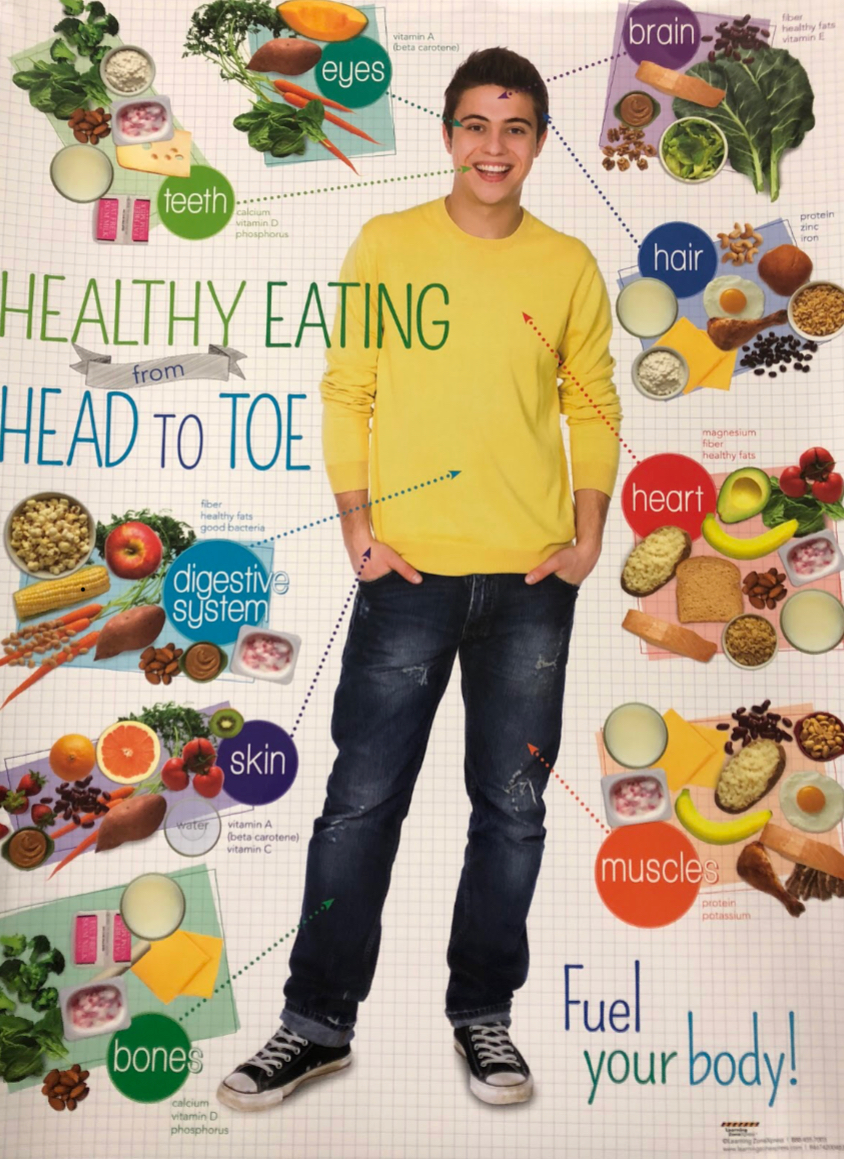How food affects your mood
November 15, 2018
Do you think that your food has a connection to your mood or your mental health? Imagine you are deciding whether you want to eat a bowl of ice cream or some vegetables. A lot of people would probably choose the ice cream. It tastes better, but your parents want you to eat the vegetables. Right? You may think it’s just because ice cream has lots of sugar, and vegetables are good for your body, but the truth goes a bit deeper than that. The sugars in ice cream cannot give enough nutrients for your body to function properly. You need a balance between junk food, and fruits and veggies in order to have the energy you need to perform at your highest every day.
Food’s role in our bodies
We looked at a wide variety of sites and found the best information that supports this idea. We were able to conclude food is a necessary part of our daily lives, and we may not think much of it, but the food we eat affects our bodies in a plethora of different ways. Food is crucial for survival, and if the body doesn’t get the nutrients within a food, our cells don’t receive enough energy and are unable to perform the important tasks we need to function from day to day.
Food is especially needed for growth, development, and body function. Food also helps to repair muscles, as well as builds and rebuilds DNA. Without food, our bodies do not have enough energy to complete these necessary functions. This means that the metabolic processes that go on in cells would slow to a halt.
Food gives us the energy and nutrients to grow and develop, be healthy and active, to move, work, play, think and learn.
— Ms. Hanson
How food affects our bodies?
Our bodies rely heavily on the energy and nutrients we receive from food. If we don’t receive the nutrients we need, the body can react in negative ways. Health problems like depression increased levels of anxiety, and blood sugar spikes and crashes can arise if food isn’t ingested on a regular basis.
What type of food helps?
Too much of any type of food can be harmful to our bodies and mental health. A variety or blend of vitamins, proteins, and complex carbs can be beneficial to our brains and bodies.
Foods that are rich in complex carbs help your mental health because they contain lots of proteins, vitamins, and fibers which have been proven to boost your mood. If you’re looking for foods like these, try adding more eggs, poultry, dairy, fruits and vegetables, oats, and beans to your diet.
there’s a whole circle about mental health
— Ms. Donovan
Something else to watch out for, are foods with more calories because they often have more fat in them. These foods are called simple carbs, products that provide energy but are usually lacking in vitamins, minerals, and fiber. They might taste good, but they have a negative impact on your health. Ms. Donovan, the Director of Nutritional Services at our school explained that “ there’s a whole circle about mental health”. This means that if you aren’t feeling good because you are hungry or tired then your mood and your motivation will decrease, this can then lead to a drop in your participation or grades.
Examples
Omega 3 fatty acids help to provide the energy your body needs for your brain functions. Eating foods like nuts, berries, fruit and vegetables, and even dark chocolate can help with increasing the energy used to carry out functions in your body. Not only that, but they also help your brain send the signals that tell your heart to keep beating.
Junk food and most sugary foods result in negative effects on your brain which impacts your memory, mood, and ways of thinking. If you feel stressed, anxious or notice signs of depression, try to improve your diet to include the necessary vitamins, fibers, and proteins, and try to exercise or meditate, which helps with the elimination of stress and a positive outlook on life and help you continue with your diet.
People believe that for a healthy diet you have to cut out junk food, due to the high amounts of sugar, but this is not true. Junk food in moderation is fine, too much of it though is harmful because there are not enough nutrients. This is true for all foods though, too much of one food and not of the other is not a balanced diet.
Even if your diet is fruits and vegetables, too much of them can harm you. Some people become obsessed with their health, this can be good, but it can also be bad. If you are stressed, anxious or notice signs of depression, try to add necessary vitamins, fibers, and proteins or take a step back and exercise or meditate.
Because food plays such an important role in students lives, you should eat every two to three hours. If you eat breakfast at seven you should consume a small snack around nine or ten. Lunch should then be eaten around noon, with another small snack around two or three. Dinner should be eaten around five or six, and no later than eight. Spacing out snacking, and ensuring that the meals that you’re consuming are healthy is vital to keeping a balanced diet.
Having a set eating schedule can be helpful in the long run. Skipping a meal can damage our bodies because it can result in a lack of necessary energy or nutrients. It is important to eat breakfast before school or work. Ms. Donovan, the Director of Nutritional Services emphasized the importance of eating healthy and consistently by saying, “Breakfast is the most important meal of the day because you can’t learn if you’re hungry”- Ms. Donovan

Schools have been trying to incorporate more whole grains, vegetables, and healthier foods into the cafeteria lunches. Ms. Donovan explained to us in 2011, schools introduced a healthier menu to keep students well fed and focused during school. “You’re not going to be able to pay attention in school, then again you don’t pay attention in school you don’t get good grades, you get kinda bummed out.” Ms. Donovan. By this, she explains that if you receive grades that upset you it will cause you to become less motivated and the domino effect, where one thing leads to another and so on. This constant cycle gets worse and worse, influencing your work effort, grades, and sleep schedule. But with a healthy, well- balanced diet, you will be able to focus, put in more effort and also be happy. All of these components help with your health. Your mental and physical health is very important, so take care of them.
If you do not know what is healthy or is a good meal, here is a list of meals for breakfast, lunch, and dinner:
Breakfast: fruit smoothie with Greek yogurt, eggs with vegetables, oatmeal, fruit (apples also help with waking you up) and avocado toast.
Lunch: salads with vegetables, sandwiches or wraps, and soup or chili.
Dinner: meals with protein, vegetables, and carbohydrates, for example, rice, vegetable of choice and a meat, bread, salad with beans, pasta with side vegetables.
Sources:
“Mood Food: Can What You Eat Affect Your Happiness?” Healthline. Accessed November 15, 2018. https://www.healthline.com/health/mood-food-can-what-you-eat-affect-your-happiness.
“Food and Mood.” Clinical Negligence | Mind, the Mental Health Charity – Help for Mental Health Problems. Accessed November 15, 2018. https://www.mind.org.uk/information-support/tips-for-everyday-living/food-and-mood/.
Iliades, Chris. “6 Ways Food Affects Your Mood.” Stroke Center – EverydayHealth.com. September 18, 2014. Accessed November 15, 2018. https://www.everydayhealth.com/news/ways-food-affects-your-mood/.
Selhub, Eva. “Nutritional Psychiatry: Your Brain on Food.” Harvard Health Blog. April 05, 2018. Accessed November 15, 2018. https://www.health.harvard.edu/blog/nutritional-psychiatry-your-brain-on-food-201511168626.
Editors-etnt. “The Negative Effects of Fast Food on Your Body | Eat This, Not That!” Eat This Not That. October 16, 2018. Accessed November 15, 2018. http://www.eatthis.com/what-happens-to-your-body-when-you-eat-fast-food/.
“How Does Food Impact Health?” Taking Charge of Your Health & Wellbeing. Accessed November 15, 2018. https://www.takingcharge.csh.umn.edu/explore-healing-practices/food-medicine/how-does-food-impact-health.
